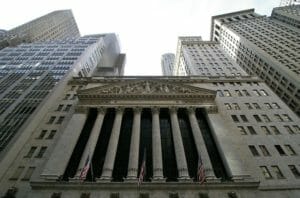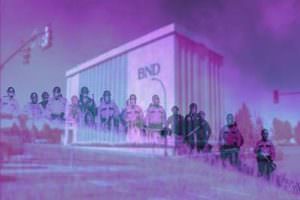Debate: ‘Public Banks Are Key to Capitalism’
Former Truthdigger of the Week and Public Banking Institute President Ellen Brown led a debate in The New York Times' opinion pages this week, arguing: "We actually need publicly owned banks for a capitalist market economy to run properly."
Former Truthdigger of the Week and Public Banking Institute President Ellen Brown led a debate in The New York Times’ opinion pages this week, arguing: “We actually need publicly owned banks for a capitalist market economy to run properly.”
“To ask whether public banks would interfere with free markets assumes that we have free markets, which we don’t,” Brown begins. “Banking is heavily subsidized and is monopolized by Wall Street, which has effectively ‘bought’ Congress. Banks have been bailed out by the government, when in a free market they would have gone bankrupt. The Federal Reserve blatantly manipulates interest rates in a way that serves Wall Street, lending trillions at near-zero interest and pushing rates so artificially low that local governments have lost billions in interest-rate swaps.”
Brown points to precedents for public action in markets. Neoliberals claim this arrangement distorts the so-called free market, but public lending programs run by state and municipal governments often concern sectors neglected by private enterprise. “Montana finances first-time ranchers and farmers; Sonoma County has its Energy Independence Program; and San Francisco has half a dozen mortgage lending and small business programs,” she notes. Public banks around the world lend where private banks won’t. This doesn’t damage the profitability of private banks. Germany and Taiwan, Brown points out, which have strong public banking sectors, are among the most competitive banking markets on the globe.
“In North Dakota, the only state with its own ‘mini-Fed,’ ” Brown continues, “the state-owned Bank of North Dakota routes its public lending programs through community banks. The Bank of North Dakota cooperates rather than competes with local banks, aiding with capital and liquidity requirements. Its deposit base is almost entirely composed of the revenue of the state and state agencies. North Dakota has more banks per capita than any other state, because they have not been forced to sell to their Wall Street competitors. The North Dakota Bankers’ Association endorses the Bank of North Dakota, which has a mandate to support the local economy.
“The Bank of North Dakota takes almost no individual deposits, but a national postal bank would, just as postal banks have done routinely in other countries without destabilizing free markets. One-fourth of American families are unbanked or underbanked. With $3 trillion in excess deposits, Wall Street doesn’t want these small depositors.”
Financial services should be thought of as essential physical infrastructure, just like roads and bridges, Brown concludes. “By providing inexpensive, accessible financing to the free enterprise sector of the economy, public banks make commerce more vital and stable. Public banking is not a radical idea but has been practiced in the U.S. with excellent results for decades, and around the world for centuries.”
Read responses to Brown and comments on the subject by the full roster of debaters here.
— Posted by Alexander Reed Kelly.
Your support matters…Independent journalism is under threat and overshadowed by heavily funded mainstream media.
You can help level the playing field. Become a member.
Your tax-deductible contribution keeps us digging beneath the headlines to give you thought-provoking, investigative reporting and analysis that unearths what's really happening- without compromise.
Give today to support our courageous, independent journalists.





You need to be a supporter to comment.
There are currently no responses to this article.
Be the first to respond.